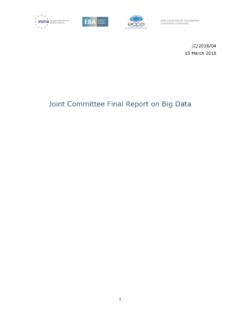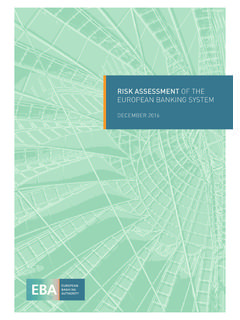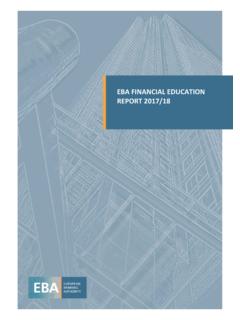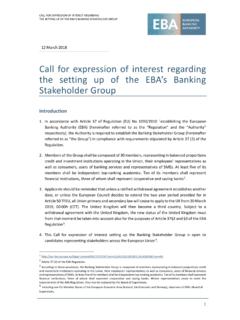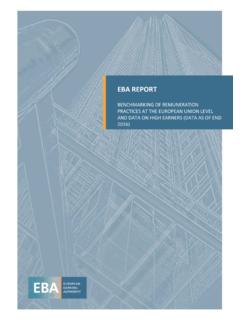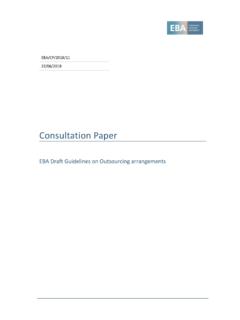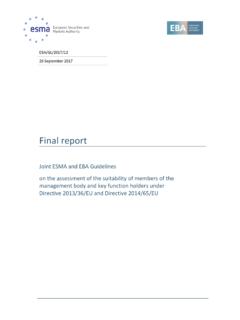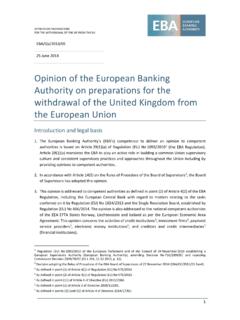Transcription of Final Report - eba.europa.eu
1 Final Report ON GUIDELINES ON SOUND REMUNERATION POLICIES UNDER IFD EBA/GL/2021/13 22 November 2021 Final Report on Guidelines on sound remuneration policies under Directive (EU) 2019/2034 Final Report ON GUIDELINES ON SOUND REMUNERATION POLICIES UNDER IFD 2 Contents Executive Summary 5 Background and rationale 6 2. Subject matter, scope and definitions 19 Subject matter 19 Addressees 19 Scope of application 19 Definitions 19 3. Implementation 22 Date of application 22 Transitional provisions 22 4. Guidelines 23 Title I - Remuneration policies 23 1. Remuneration policies for all staff 23 2. Governance of remuneration 26 Responsibilities, design, approval and oversight of the remuneration policy 26 Shareholders involvement 28 Setting up a remuneration committee 29 Composition of the remuneration committee 29 Role of the remuneration committee 30 Process and reporting lines 31 Review of the remuneration policy 31 Internal transparency 33 3.
2 Remuneration policies and group context 33 4 Proportionality 34 5. The identification process 38 Prior approval of exclusions 40 Governance of the identification process 41 Identification process on individual and consolidated level 42 Role of the Union parent undertaking 43 Role of subsidiaries and branches 43 6. Capital base 44 Title II - Structure of remuneration 45 7. Categories of remuneration 45 8. Particular cases of remuneration components 46 Final Report ON GUIDELINES ON SOUND REMUNERATION POLICIES UNDER IFD 3 Allowances 46 Variable remuneration based on future performance 47 Dividends and interest payments 48 Retention bonuses 48 Discretionary pension benefits 50 9.
3 Exceptional remuneration components 51 Guaranteed variable remuneration 51 compensation or buyout from previous employment contract 51 Severance and other payments after the end of a contract 52 Severance pay 52 Other payments after the end of a contract 54 10 Prohibitions 55 Personal hedging 55 Circumvention 56 Title III Remuneration of specific functions 58 11. Remuneration of members of the management and supervisory function of the management body 58 12 Remuneration of control functions 58 Title IV Remuneration policy, award and pay-out of variable remuneration for identified staff 59 13. Remuneration policy for identified staff 59 Fully flexible policy on variable remuneration 60 Ratio between fixed and variable remuneration 60 14.
4 Risk alignment process 62 Performance and risk measurement process 63 Risk assessments 63 Risk-sensitive performance criteria 64 Specific criteria for control functions 65 Award process 65 Setting of bonus pools for identified staff 66 The ex ante risk adjustment in the award process 67 15. Pay-out process for variable remuneration 68 Non- deferred and deferred remuneration 68 Deferral period and proportion of deferred remuneration 68 Vesting of deferred remuneration 70 Award of variable remuneration in instruments 70 Minimum portion of instruments and their distribution over time 72 Retention policy 72 Risk adjustment 73 Malus and clawback 73 Final Report ON GUIDELINES ON SOUND REMUNERATION POLICIES UNDER IFD 4 Implicit adjustments 74 Title V investment firms that benefit from government intervention 75 16.
5 State support and remuneration 75 Title VI - Competent authorities 76 17. Remuneration policies 76 20. Disclosures 77 21. Colleges of supervisors 77 5. Accompanying documents 78 Draft cost-benefit analysis/impact assessment 78 Feedback on the public consultation and the opinion of the Banking Stakeholder Group 82 Final Report ON GUIDELINES ON SOUND REMUNERATION POLICIES UNDER IFD 5 Executive Summary investment firms have to apply sound remuneration policies to all staff and some specific requirements for the variable remuneration of staff whose professional activities have a material impact on the risk profile of the investment firms or the assets they manage (identified staff) under Directive (EU) 2019/2034 (IFD)).
6 The IFD mandates the EBA to develop guidelines on remuneration policies for all staff as part of investment firm s internal governance arrangements, remuneration policies for identified staff that take into account the criteria in Articles 30 and 32 of the IFD and guidelines that facilitate the implementation of waivers by Member States. The EBA published guidelines on remuneration policies under Directive 2013/36/EU (CRD) in 2015 that were applicable to credit institutions and investment firms. Those guidelines form the basis for the present guidelines, as the underlying provisions in CRD and IFD follow the same regulatory approach.
7 In addition, the requirements for investment firms, introduced by the IFD, are further specified in these guidelines. The alignment of the frameworks for credit institutions and investment firms ensures a level playing field and cross-sectoral consistency, while the application of the principle of proportionality is taken into account. The guidelines are addressed to investment firms as defined in Article 4(1)(1) of Directive 2014/65/EU that do not meet all of the conditions for qualifying as small and non-interconnected investment firms under Article 12(1) of Regulation (EU) 2019/2033 and competent authorities.
8 The guidelines apply on an individual basis in accordance with Article 25 IFD and Article 7 of Regulation 2019/2033/EU (IFR) and unless Article 8 of the IFR is applied by competent authorities, on a consolidated basis. All investment firms must also comply with the national implementation of requirements under Directive 2014/65/EU (MiFID). The guidelines specify further the requirements on remuneration policies in Directive (EU) 2019/2034 with regard to the respective governance arrangements and processes which should be applied when remuneration policies for all staff and for identified staff are implemented.
9 Remuneration policies must be gender neutral in accordance with Directive 2019/34/EU and respect the principle of equal pay for male and female workers for equal work or work of equal value. The guidelines specify the elements that investment firms should implement in this regard. While parts of the guidelines concern sound and gender neutral remuneration policies for all staff, the main part of the guidelines focuses on the specific provisions that apply to investment firms remuneration policies for identified staff. In particular for identified staff, the alignment of the variable remuneration with the risk profile of the investment firms or the assets they manage is crucial.
10 The guidelines will be applicable as of 30 April 2022. Final Report ON GUIDELINES ON SOUND REMUNERATION POLICIES UNDER IFD 6 Background and rationale 1. Inappropriate remuneration structures have been a contributing factor to excessive and imprudent risk taking. Poorly designed remuneration policies have potentially detrimental effects on the sound management of risks, control of risk and the risk taking behaviour of individuals. Most investment firms were subject to the remuneration framework under Directive 2013/36/EU (CRD) until 26 June 2021. Since then a specific prudential framework for investment firms set by Directive (EU) 2019/2034 (IFD) has applied.
